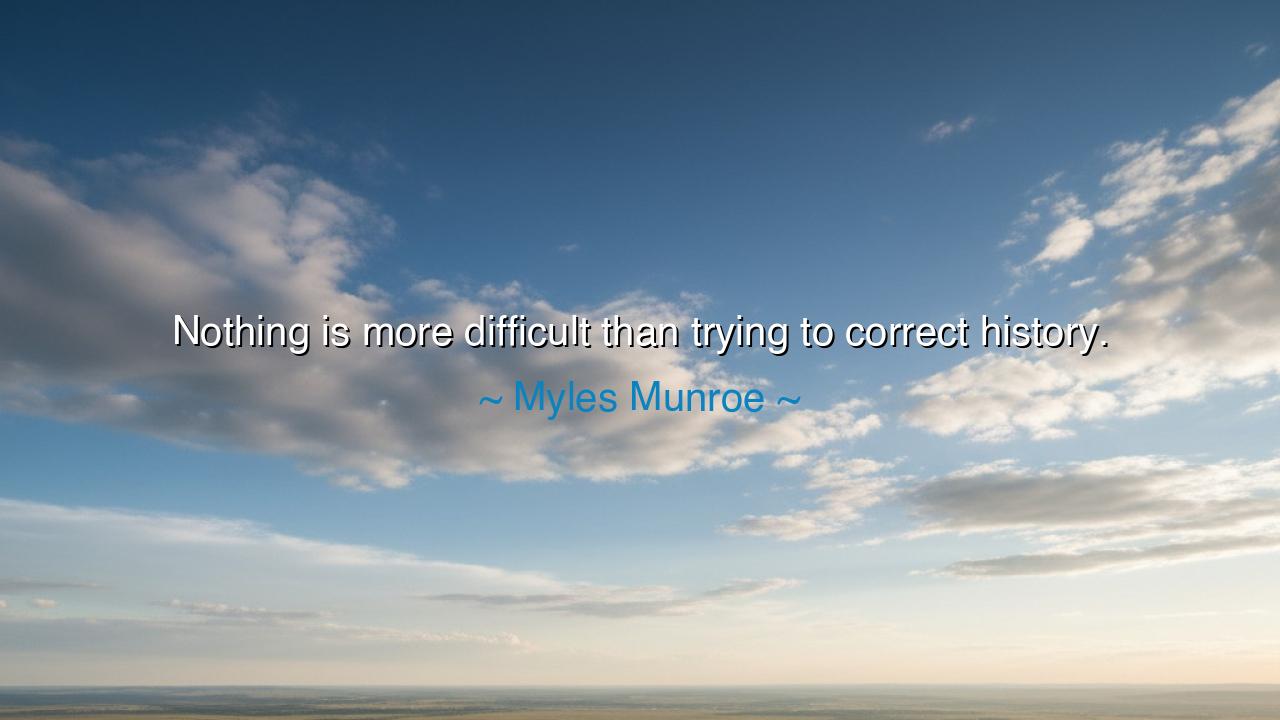
Nothing is more difficult than trying to correct history.






“Nothing is more difficult than trying to correct history.” — Myles Munroe
Hear, O children of wisdom and time, the solemn voice of Myles Munroe, the preacher, teacher, and visionary from the islands of the sea, who spoke not merely of faith but of purpose and truth. In this profound saying, he reveals one of the great burdens of human existence: that history, once written by the hands of men, becomes a stone that cannot easily be reshaped. To correct history — to right its errors, to undo its injustices, to reclaim its forgotten truths — is among the hardest labors of the spirit. For the past, though it is gone, casts a long shadow upon the present; and those who try to lift that shadow must struggle against both memory and myth, against those who benefit from falsehood and those who fear the truth.
The origin of this insight lies in Munroe’s lifelong mission to awaken the minds of people — especially those whose histories were distorted, suppressed, or stolen. Born in the Bahamas under the weight of colonial legacy, he understood that a people’s identity begins with its history. To be told who you are by others is to be enslaved in thought, even when your body is free. Thus, he spoke not merely as a philosopher, but as one who knew that rewriting truth — reclaiming what has been erased — is a task both sacred and perilous. It requires courage to confront the comfortable lies of nations and the hidden shame of empires.
When Munroe says “Nothing is more difficult than trying to correct history,” he reminds us that falsehood, once accepted by generations, becomes a fortress. To correct it is not to polish words in books, but to transform hearts and minds. The lies of history often serve the powerful; they are woven into education, monuments, and memory itself. The oppressed must then fight not only for justice in the present, but for recognition in the story of the past. Yet this battle is not waged with weapons, but with truth — and truth, though unyielding, often walks slowly.
Consider the story of Nelson Mandela and the long night of apartheid in South Africa. For decades, the history of that land was written by those who claimed moral right through conquest. They told the world that separation was natural, that justice belonged to one race alone. Yet when freedom came, Mandela and his people faced not only the task of governing, but the greater task of correcting history — of teaching a nation to see what had been done, to remember truthfully, and to forgive wisely. The Truth and Reconciliation Commission, led by Archbishop Desmond Tutu, was an act of immense courage — an effort to heal a country by facing its wounds instead of burying them. It did not erase the pain, but it allowed truth to breathe. And in that breath, history began to be rewritten — not by the victors, but by the redeemed.
Munroe’s words also echo through the struggles of many nations that still wrestle with the misuse of history — when conquest is called discovery, when slavery is softened by silence, when oppression is renamed progress. To correct such narratives is to challenge pride, to awaken conscience, and to endure resistance from those who would rather sleep. Yet the work must continue, for history left uncorrected becomes a poison that seeps into the soul of the future. The lies of yesterday are the chains of tomorrow; only truth can break them.
But let not despair take root, for though the task is hard, it is not hopeless. The act of correcting history begins not in governments or textbooks, but in the hearts of the living. Each person who seeks to learn beyond what they were taught, who listens to the voices once silenced, who honors the stories once hidden — such a person becomes a restorer of truth. Through remembrance and humility, we participate in the slow healing of humanity’s memory. For every history corrected brings the world one step closer to justice.
So take this as your charge, O listener and seeker of light: Be a keeper of truth. When you hear the stories of your people, learn them deeply. When you see injustice written as glory, question it. When the past is buried, uncover it — not to condemn, but to understand, and to set free those bound by ignorance. For Myles Munroe was right: there is nothing more difficult than trying to correct history — but there is also nothing more noble. Those who dare to confront the lies of the past build a foundation of truth for the future. And from such foundations rise the civilizations that endure — not upon deceit, but upon wisdom, remembrance, and righteousness.






AAdministratorAdministrator
Welcome, honored guests. Please leave a comment, we will respond soon